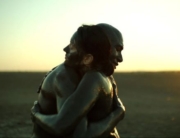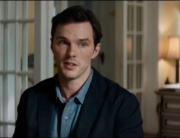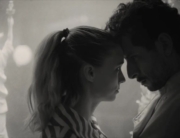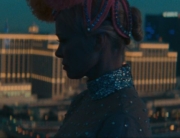Electrick Children pulls from a bizarre combination of coming-age-films, including Saved, Almost Famous, and even The Graduate, to create an even stranger story of a young girl who finds herself miraculously pregnant. It depicts a myriad of wacky ideas, some which don’t seem to make sense when added all together. Still, I found myself pretty intrigued. Electrick Children might be biting off a bit more than it can chew, but it certainly looks good doing it.
Angelic Rachel, played by Julia Garner, who was recently seen in another coming-of-ager, The Perks of Being a Wallflower, is a 15-year-old living with her fundamentalist Mormon family off a back road in Utah. On her birthday, her father questions her about her faith, recording her answers on a cassette player. Never having seen a cassette player before, Rachel becomes fascinated by the forbidden technology. Her brother, whom everyone calls Mr. Will (Liam Aiken), takes the player down into a cellar, where Rachel knows she isn’t supposed to go. Her curiosity gets the better of her, and she sneaks down into the cellar, finds a mysterious blue cassette tape, and her life is changed forever.
The tape contains a version of the song “Hanging on the Telephone,” originally by the Nerves, made famous by Blondie in the late ’70s, and covered here by the band Flowers Forever. Rachel becomes entranced by this new kind of music and the male singer’s voice. Her discovery is interrupted by Mr. Will and her mother. A few months later, Rachel suspects she might be pregnant and blames this miracle on the man singing on the tape. After confessing to her parents (played by the odd casting of Billy Zane and Cynthia Watros), they suspect Mr. Will is responsible, though both siblings firmly deny it. Rachel’s father arranges a marriage for her with a local boy and kicks Mr. Will out of the house.
Believing her child to be the son of God, and not okay with her parents’ plan, Rachel steals their pickup truck and runs away to Las Vegas Vegas in search of the man singing on the recording. Mr. Will is unwilling dragged along on the journey, as he was hiding out in the back of truck when she took off in the middle of the night. Upon arriving in Sin City, Rachel clings to the first group of young musicians she finds, convinced the guitarist is the singer she’s looking for. They are juvenile delinquents, and they let Rachel and Mr. Will tag along during their escapades. Clyde (Rory Culkin), a runaway from a wealthy family, takes a keen interest in the very out of place brother and sister. The rest of the film follows Rachel’s search, plus her and her brother’s experience in a new world very different from their sheltered community.
As evidenced by the plot, Electrick Children jams a lot of ideas about religion, music and adolescence into one film, and the revelation about the man on the tape adds to this strange mix. What is most disorienting about the film is the time period. The use of “Hanging on the Telephone” made me think this was the ’80s, but Rachel states later in the film that she was born in 1996, making it 2011. It seems this disorientation is intentional, though the emphasis on conflicting eras isn’t very enlightening. Flashback and flash-forward imagery creates an even blurrier, meandering vision, though the cinematography is gorgeous. Garner, as well as all the young actors, gives a strong performance, but there’s so much going on, it’s tough to get a sense of focus.
The use of sound may be the most fascinating part of a film filled with peculiar, hard to connect elements. Rachel narrates the film, heard through the crackling sounds of her voice recorded on the cassette player. Sound elements from the end of the film infiltrate the opening scenes, and often audio will cut out completely. The constant playing of “Hanging on the Telephone” is one of the most interesting uses of song I’ve ever seen. It makes sense; it’s a song about technology, which obviously fascinates Rachel. It also seems to come out of left field. As far as captivating rock songs go, it’s not one that comes to mind. It is, however, incredibly catchy. The song may not exactly give any answers to a film with a lot of questions, but I’ve had it stuck in my head ever since the end credits rolled.







Leave A Comment